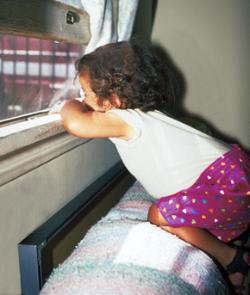Keeping your children safe from lead hazards
 Here are some other ways to reduce lead exposure at home:
Here are some other ways to reduce lead exposure at home:
- Cover holes in the wall and chipping and peeling paint with duct tape or contact paper. Move beds, cribs, and playpens away from peeling paint. Do not let children play near painted surfaces that often rub together or get bumped, such as doors and windows. Do not let children chew on painted furniture, and cover crib rails with a plastic guard to keep children from chewing on them. Place a small rug (that can be washed regularly) over carpeted play areas to reduce exposure to lead dust in carpets.
- Wash children's toys, bottles, pacifiers, and stuffed animals often. Don't let children put painted toys in their mouths, unless you know there isn't lead in the paint.
- Wash children's hands and faces often, especially before eating and sleeping.
- Serve and store food in lead-free containers, such as glass, stainless steel or plastic. Don't store food in open cans, especially cans from other countries. Never heat food in cans.
- If someone in the home works with lead on the job, he or she should shower and change clothes before going home. Work clothes should be washed separately from other clothes. Household members working with lead should follow all occupational safety guidelines for cleaning and storing work clothes and equipment.
- If someone in the home works with lead as a hobby, they should have a separate hobby area in the home or some other location. Children should not visit hobby areas, and they should be kept clean by properly getting rid of materials containing lead.
- Avoid folk medicines and cosmetics that contain lead. Greta and Azarcon are used to treat an upset stomach. Pay-loo-ah is a red powder used to treat a rash or fever. They all contain lead. Do not give them to children!
- Reduce lead exposure from tap water. Only cold water should be used for cooking, drinking, and making baby formula. Let the water run for a few minutes or until it feels much colder than your hand before using it.
- Soil/dirt may contain high levels of lead. If you suspect your soil may have lead, purchase a home lead test kits available by mail order/online. Watch children when they play and make sure they don't eat dirt. Avoid bringing soil into the home by making sure everyone removes their shoes outside the home and uses a door mat. Lead dust from soil can blow from yard to yard in the neighborhood. Test soil for lead before planting vegetables and plant gardens away from roads and old buildings or grow vegetables in pots with new soil.
View more information on reducing lead hazards in the home and lead abatement.

